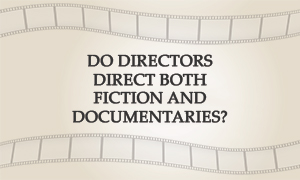 I am working on a long-term research project looking at gender among documentarians. Previously, I’ve studied the gender split among directors, producers, writers, cinematographers, composers and sales professionals – but always focusing on fictional feature films.
I am working on a long-term research project looking at gender among documentarians. Previously, I’ve studied the gender split among directors, producers, writers, cinematographers, composers and sales professionals – but always focusing on fictional feature films.
As I branch out to study factual films, I wanted to do a couple of micro-research projects to learn just how similar the worlds of factual and fictional filmmaking are.
First up: do documentary directors also direct fictional films? And vice versa?
I started by building a database of all feature films made around the world in the past two decades (1999-2018 inclusive), both factual and fiction. See the Note section at the end of this piece for more details.
How many people have directed a feature film?
Over the past twenty years, the number of feature film directors is a strangely round number: 102,000. Of those, 25,249 have directed at least one documentary feature film.
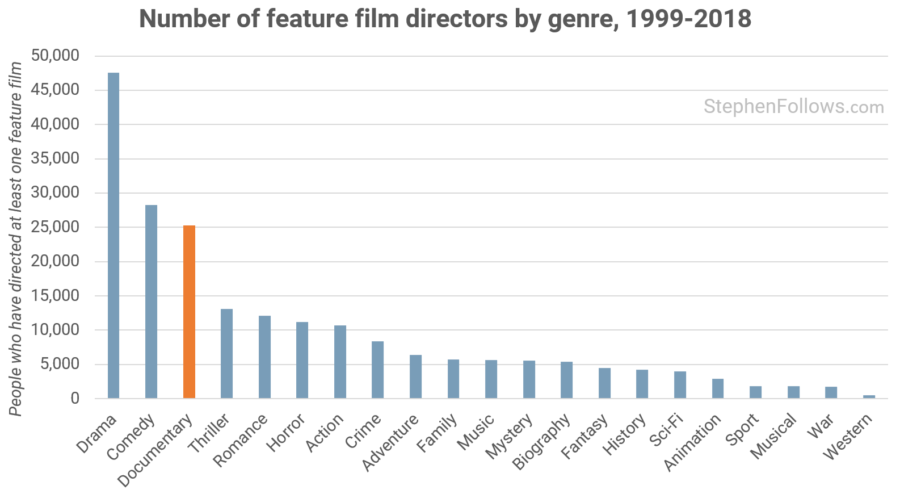
Drama is the most commonly directed genre, due to a couple of major factors:
- Genre classification systems tend to class many films as a drama. The system I’m using allows for up to three genres per movie and so drama can be used both as a primary genre (i.e. for a dramatic film like The Lives of Others) and as a secondary genre (i.e. Gladiator).
- Drama is the cheapest genre to make. The majority of films in my dataset will be low budget films and they are more likely to be dramas than, say, films costing over $100 million.
Do diligent documentarians direct desultory dissimulations?
Now that we have the directors in our sights, let’s look at the overlap between documentary and fiction filmmaking.
As the chart below shows, almost two-thirds of directors of fiction biographical films have also directed a feature-length documentary. Other fictional genres popular with documentarians are history (58%), sport (43%) and music (38%).
At the other end of the spectrum, we find genres that have less of an overlap with the real world, such as horror (4%), thrillers (5%), action (6%), sci-fi (6%) and, hopefully having something to do with the real world, romance (7%).
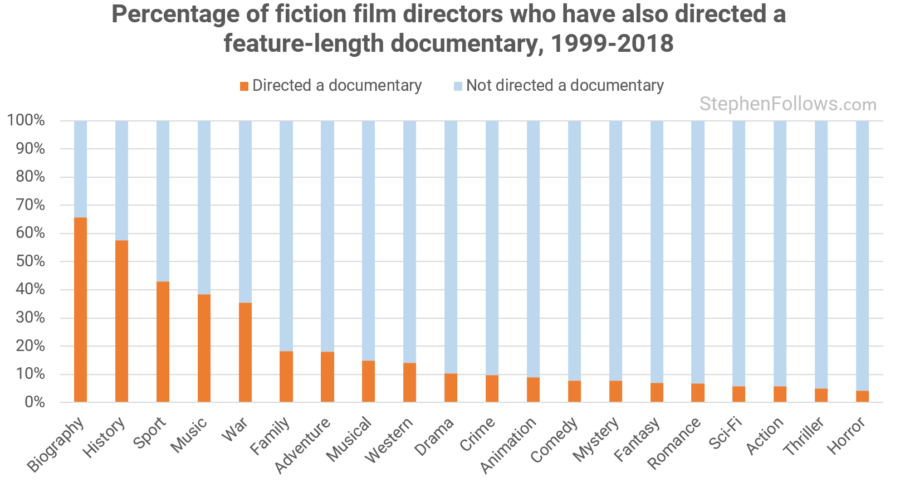
To end, I thought it would be interesting to visualise the same data another way.
Below I have taken the four genres with the biggest overlap, and the four with the smallest, and displayed them as Venn diagrams. The size of the orange circles represents the number of people who have directed at least one film of that genre in the past twenty years and the dark orange sections are people who have directed films in both genres.
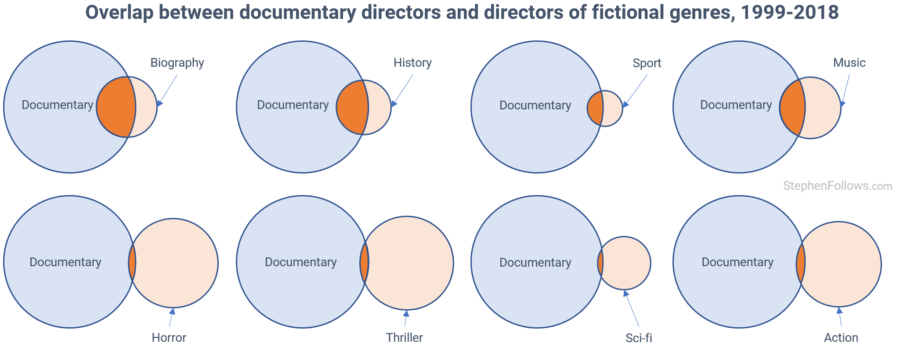
Further reading
If you want to learn more about some of the topics raised in today’s article then you may enjoy these previous research projects:
- How successful are UK documentaries in cinemas?
- Are “the best British films” documentaries?
- How many films does the average director make?
- Genre trends in global film production
Notes
My data came from a variety of sources, including IMDb, Wikipedia, The Numbers, Movie Insider and more. I am still getting my head around how to classify documentaries, as some may be intended for the big screen but actually only get broadcast on television. For today’s research, I included all films classed as feature films on online listing sites, with a running time of at least 60 minutes. The genre classification system is that of IMDb, in which films are permitted to have multiple genres.
Epilogue
This is just the first of a few studies I’m going to conduct into the world of feature-length documentaries. If you have any suggestions of what to look into, please leave me a note in the comments below or drop me a line.


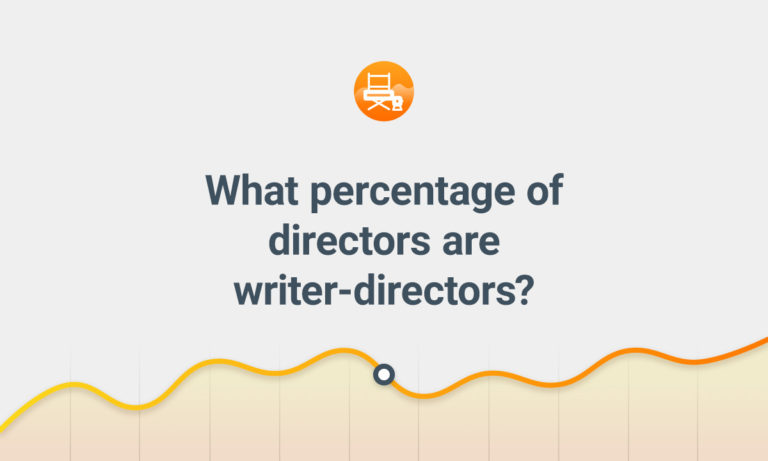
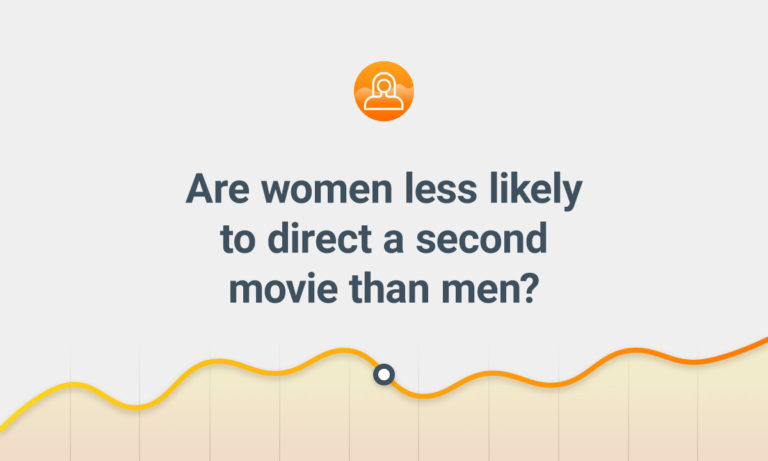

Comments
Many directors, cinematographers and other professionals tend to start with documentaries and then move up the ladder to feature films.
Interesting. But how are multiple genre entries handled? Does a film that covers 3 genres get counted as 3 films? And why the 60 minute cut-off? I imagine there are film/docs that are intended for TV that are shorter than a full 60 minutes. Is the type of documentary a factor in deciding the next type of project? Is there a difference if one makes an historical doc versus current events? What about sequence? Do younger film makers favor docs and then move into mainstream movies? Are docs a proving ground for young talent? If so, is there a connection between doc gross and their next project? And what about the business linkages? Are doc distributors more tied in with mainstream distributors of a certain genre than others? I’m wondering if the choice of genre is more a function of business connections than it is director preference.
Good questions!